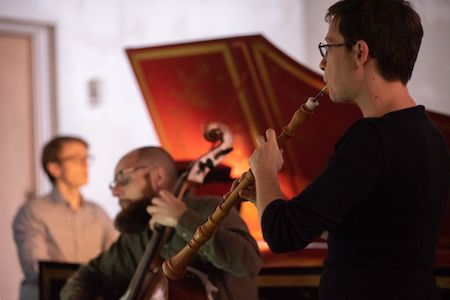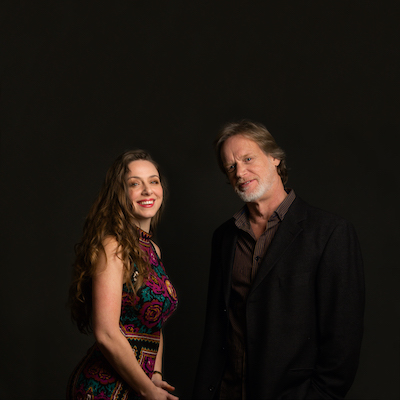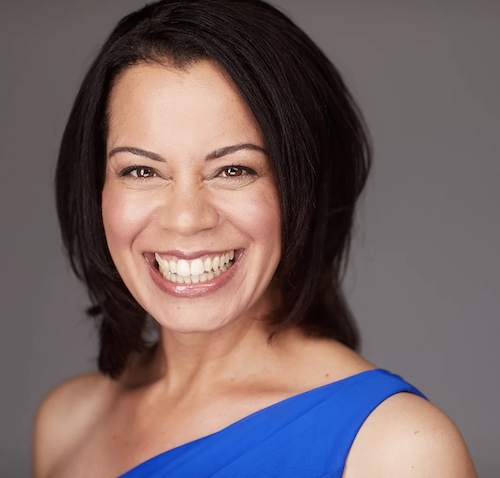by Jarrett Hoffman

It was also, as she told me in April, the “sea” of invites to live concerts streamed from living rooms. It was overwhelming. One thing she found nourishing was programming potential concerts, planning for a future where artists could once again “collaborate in meaningful ways.”
Looking back now, it’s clear that Nagy was always going to find her own unique way to approach music-making in the time of COVID. Enter SalonEra, a free series that begins August 24 and represents one half of Les Délices’ 2020-21 season.
On the most basic level, SalonEra is a collection of recent pre-recorded collaborations, live conversations, and archived footage interwoven as variety shows to be watched from home twice a month, in what’s being billed as “a salon experience for the 21st century.”
As Nagy told me during a recent Zoom call, it’s also a rethinking of community engagement when other free programs from the ensemble, like school visits, family concerts, and open rehearsals, are on hold. And with geographic distance no longer a limitation, that community with which to potentially engage is a whole lot bigger.
Les Délices is taking advantage of that: local artists will come together with those from across the country, and emerging musicians with those who are more established. Artists of color will make up a quarter to a third of the fall roster, Nagy estimates.
The aim with each episode’s live conversations is to go beyond happy introductions and welcomes. Nagy hopes to capture a sense of rapport among the musicians, perhaps as a starting point, and to discuss “why we’re here and what we’re interested to share.”
That’s part of a larger goal to build a narrative frame around each program, and answer the types of questions that Nagy feels are often left unanswered when videos of classical music pop up on social media: “What am I to understand about this? Why should I care?”
All of those aspects combined, SalonEra has felt to Nagy like a particularly palpable and powerful way to build community. “I think it’s the most important outreach project that Les Délices has ever taken on,” she said.
Episode One, “All-Bach,” airs on Monday, August 24 at 7:30 pm. It’s devoted to the most famous member of that musical dynasty, Johann Sebastian, whose music is often described as timeless and healing. Understandably, that’s made it a popular choice during the pandemic.
It’s a more traditional program than Les Délices is known for, Nagy admitted. “I wanted to come out of the gate with something that would appeal to a lot of people, and I’m really happy with how it’s turned out.”

Violinist Shelby Yamin, also the Associate Producer, will play excerpts from the Partita in d, and will partner with Nagy in the slow movement of the Double Concerto for oboe and violin, BWV 1060. “She’s absolutely spectacular,” said Nagy, the series’ Executive Producer, who will solo in the Adagio from the Sonata in E, BWV 1035.
Sherezade Panthaki, a “fantastic soprano” born in India and based in New Haven, will sing arias from the cantatas BWV 202 and 84 (“Sich üben im lieben” and “Ich esse mit Freuden”). And the technological wizard throughout the series is Milnes, who will not only produce the videos but also mix all of the audio.
“Classical Salon” (September 7 at 7:30 pm) will focus on music for the living room, including selections by Hadyn and Weber as well as a couple of lesser-known masters: Georg Druschetzky (represented by his Oboe Quartet in g) and Joseph Boulogne, Chevalier de Saint-Georges (his Sonata No. 2 in B-flat, with Allison Monroe playing both violin parts).
Another featured performer is violinist Aislinn Nosky, concertmaster of Boston’s Handel and Haydn Society and a member of the adventurous Eybler Quartet, a group that will be heard in archived footage. “In addition to recording Beethoven, they’ve made CDs of Wanhal and Asplmayr,” Nagy said, offering a couple of reasons why it’s important to explore different corners of the repertoire.
“Music by composers that you’ve never heard of can be wonderful and lovely, but it also enriches our understanding of the whole field. If we have a monoculture diet of Haydn and Mozart without that context and those other flavors, then our world is a little paler for it, as wonderful as Mozart and Haydn are.”
Also receiving the spotlight will be Houston-based violist Yvonne Smith and her period instrument ensemble La Speranza. And for a bit of period clarinet playing, Boston-based Thomas Carroll can be heard in Haydn’s Op. 50, No. 1 Quartet in an 18th-century arrangement for clarinet and strings by Vicenzo Gambaro.

“She set the agenda, as it were,” Nagy said. Kennedy suggested pairing excerpts from Jean-Philippe Rameau’s 1721 cantata Orpheé with music from the 1959 film Black Orpheus, which includes classics of bossa nova such as Luiz Bonfá’s Manhã de Carnaval. (That selection ties in nicely to Les Délices’ own history — it was part of their March 8 “Torchsongs Transformed” program. Watch that performance on YouTube.)
Of course, Rameau and Bonfá represent quite a span of both time and genre, which isn’t out of the ordinary for Kennedy. “Her repertoire is quite wide-ranging, and she’s felt that the pandemic has allowed her to explore even further,” Nagy said.
And with the presence of another important guest in that episode — Case Western scholar and MacArthur “genius grant” recipient Susan McClary, who’s known in part for her work in feminist musicology, and who Nagy called “brilliant” — the element of conversation certainly promises to intrigue.
SalonEra is free, though a donation of $10 per episode is suggested to help compensate the participating artists.
Published on ClevelandClassical.com August 19, 2020.
Click here for a printable copy of this article


